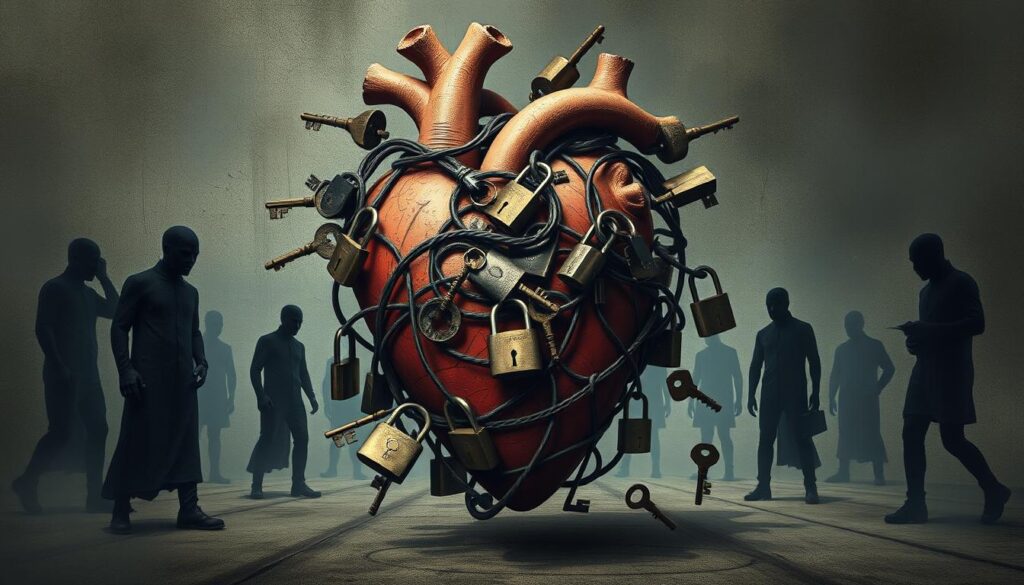Relationship OCD (ROCD) is a part of obsessive-compulsive disorder (OCD). It deals with doubts and discomfort in romantic relationships. ROCD makes it hard to enjoy and connect with your partner fully.
ROCD symptoms include thoughts that question if your relationship is right. You might doubt your partner’s love and worry about making wrong choices. These thoughts can be very stressful and harm your relationship.
If you always check on your partner or your feelings, it might be ROCD. You might also ask for a lot of reassurance. This is because you’re trying to get rid of the doubts in your mind.
Dealing with ROCD can be tough. But knowing the signs and getting help can make things better. By facing your thoughts and behaviors, you can find happiness in your relationship again.
Key Takeaways
- Relationship OCD (ROCD) is a subtype of obsessive-compulsive disorder that affects romantic relationships.
- ROCD symptoms include intrusive thoughts, obsessive doubts, and repetitive behaviors that interfere with relationship satisfaction.
- Constant scrutiny of your partner, feelings, or relationship stability can be a sign of ROCD.
- Seeking excessive reassurance is a common ROCD behavior, as individuals try to alleviate persistent worries.
- Understanding and addressing the underlying ROCD symptoms can help you maintain a healthy, fulfilling relationship.
Understanding Relationship OCD: Definition and Overview
Relationship Obsessive-Compulsive Disorder (ROCD) is a special kind of OCD. It makes you think about your romantic relationships all the time. These thoughts are very strong and keep coming back, making your daily life hard.
This condition makes you worry a lot about your partner’s flaws. You might always need to know if they love you. You could also feel very scared about your choices in the relationship.
What Makes ROCD Different from Regular Relationship Doubts
Everyone has doubts in their relationships sometimes. But ROCD makes these doubts much worse. Your thoughts become too much and stop you from enjoying your relationship.
Unlike normal worries, ROCD thoughts are hard to stop. They are also often not based on reality.
The Impact of ROCD on Daily Life
People with ROCD can’t stop thinking about their relationship doubts. This makes it hard for them to relax or be with their partner. It also affects their work, social life, and overall happiness.
Connection Between OCD and Relationship Anxiety
ROCD is connected to the causes of OCD. It involves brain chemistry and how different parts of the brain talk to each. This can lead to the obsessive thoughts and compulsive behaviors seen in ROCD.
“ROCD can severely affect a person’s ability to relax and enjoy their relationship, causing constant questioning and insecurity.”
Common Relationship OCD Symptoms
Relationship OCD (ROCD) is a special kind of OCD that deals with close relationships. If you have ROCD, you might feel many symptoms. These can really affect your daily life and how well you connect with others.
One big sign of ROCD is always doubting if your partner loves you. You might also worry a lot about your partner’s flaws. You’ll keep asking for reassurance about your feelings and your relationship.
- Repetitive thoughts questioning your partner’s love and commitment
- Obsessive concerns about relationship compatibility and authenticity
- Anxiety and compulsions related to your relationship impulses or urges
ROCD can also show up in other ways. For example, you might compare your relationship to others a lot. Or, you could have trouble enjoying being close to your partner. You might also spend too much time on social media, checking your partner’s online activities or looking for approval from others.
These symptoms can really hurt your happiness and how well you connect with your partner. Getting help and finding ways to cope are very important. They can help you deal with ROCD and make your relationships better.

“ROCD can be a debilitating condition, but with the right support and treatment, individuals can learn to manage their symptoms and build healthier, more fulfilling relationships.” – Dr. Jane Doe, Clinical Psychologist
Intrusive Thoughts and Obsessive Patterns
Relationship Obsessive-Compulsive Disorder (ROCD) can really mess up your day. It makes you doubt your partner’s love and question your relationship. You might also fear making the wrong choice in your relationship.
Repetitive Doubts About Partner’s Love
People with ROCD often doubt if their partner loves them. They look for signs that the love is fake. This makes them keep asking for reassurance, but they never feel sure.
Questions About Relationship Authenticity
ROCD also makes you doubt your relationship’s realness. You might wonder if you and your partner are right for each other. This doubt can make it hard to enjoy your relationship.
Fear of Making Wrong Relationship Choices
Fearing the wrong choice in your relationship is common with ROCD. You worry about every decision, big or small. This fear can cause indecision and anxiety.
It’s important to deal with these thoughts and patterns to manage ROCD. A therapist can help you. They use Cognitive Behavioral Therapy (CBT) to help you feel better and have a healthier relationship.

Compulsive Behaviors in ROCD
Relationship OCD (ROCD) is a type of OCD that makes people worry a lot about their relationships. This worry can really hurt their personal and social lives. People with ROCD do certain things to feel better and be sure about their relationship.
They might ask for reassurance from others, share their doubts, or avoid things that scare them. They might even try to change their partner to fit their perfect image.
But there are also secret behaviors that are hard to see. These include checking their feelings, testing their partner, or thinking about bad things that could happen. These secret actions are hard to stop because they are part of how they think and act.
It’s important to stop these behaviors to manage ROCD. Working with an OCD expert can help. They can teach ways to deal with unwanted thoughts and feelings.
Techniques like focusing on the present, not acting on every worry, and facing fears can help. These methods can make life better for those with ROCD.
| Type of Compulsion | Examples |
|---|---|
| Overt Compulsions |
|
| Covert Compulsions |
|
“Recognizing and disengaging from both overt and covert compulsions is crucial to effectively managing ROCD and breaking the obsessive-compulsive cycle.”
The Role of Social Media in Triggering Relationship OCD Symptoms
In today’s world, social media is everywhere. But for those with Relationship Obsessive-Compulsive Disorder (ROCD), it can make things worse. Seeing perfect relationships online and checking digital stuff too much can lead to endless worry.
Digital Checking Behaviors
ROCD makes people want to check on their partner all the time. They look at their partner’s social media, messages, and chats over and over. This makes them doubt and worry even more.
Online Comparison Patterns
Social media shows perfect relationships that aren’t real. This can make people with ROCD feel bad about their own relationship. They start to doubt their love and feel insecure.
Impact on Partner Communication
Spending too much time online can hurt how well partners talk to each other. People with ROCD might get lost in their thoughts and miss out on real moments. This can hurt their relationship and make it harder to trust and be close.
It’s important to deal with how social media affects ROCD. Setting healthy limits and finding ways to stop the online checking can help. This way, people can feel better about themselves and have stronger relationships.
“The constant exposure to idealized portrayals of relationships and the ease of digital checking behaviors can contribute to a cycle of obsession and anxiety for those with Relationship OCD.”
How ROCD Affects Intimate Relationships
Relationship Obsessive-Compulsive Disorder (ROCD) can make relationships very tense and unsure. It makes it hard to be close physically and emotionally. This is because doubts and worries get in the way of real connection.
People with ROCD’s partners might feel upset or hurt. They get tired of always being asked if they love them or if things are real.
ROCD can also hurt how well a couple talks and trusts each other. It makes it hard to be happy in the relationship. It causes a lot of emotional pain, worries, and problems with being close.
Those with ROCD often doubt if their partner really loves them. They might do things over and over again to check. This can hurt the relationship even more.
“ROCD symptoms can create a vicious cycle, where the need for constant reassurance and the inability to trust one’s feelings erodes the very intimacy the individual craves.”
ROCD can really hurt a relationship. Partners might feel left out, angry, or like they’re being ignored. This is because the person with ROCD can’t fully be in the relationship because of their fears and thoughts.
Getting help, like therapy and medicine, is very important. It can help fix the relationship and make it healthy again.
Treatment Options and Coping Strategies
Dealing with relationship OCD (ROCD) can feel really tough. But, there are ways to get better. The main help often comes from cognitive-behavioral therapy (CBT). This includes exposure and response prevention (ERP) techniques.
Therapeutic Approaches
ERP therapy helps people face their scary thoughts. They learn not to do things that make them feel better but worse. By facing their fears, they get better at handling anxiety.
Mindfulness can also help. It teaches people to deal with strong feelings and thoughts that come with ROCD.
Self-Help Techniques
There are things you can do on your own to get better. Keeping a journal can help you see your thoughts. Talking to people you trust can also help.
Learning to live with uncertainty is key. This is especially true in love relationships.
Professional Support Methods
Getting help from experts is very important.
With the right help, you can manage your ROCD. And you can have better, happier relationships.


A Life-Changing Experience with This Weight Loss Supplement (Nagano Tonic)
I’ve always struggled with finding a weight loss solution that actually works for me. Like many, I’ve tried numerous diets, exercise routines, and supplements over the years—some worked for a short time, but nothing ever gave me long-term results. That was until I decided to try the weight loss supplement I found : Link to the Supplement.
From the moment I started using it, I noticed a difference. Not only did I feel more energized, but my cravings also became more manageable. The best part? I started seeing results much quicker than I anticipated! Over the course of just a few weeks, I noticed a significant reduction in belly fat and overall weight loss that I hadn’t been able to achieve before.
What makes this supplement stand out from all the others I’ve tried is how it supports me in my daily routine without any jitters or energy crashes. I’m able to stay focused and motivated, which has made it easier to stay on track with my diet and exercise plan.
This product truly exceeded my expectations, and I feel more confident and healthier than ever before. If you’re struggling with your weight loss journey like I was, I highly recommend giving this supplement a try. It’s been a game-changer for me, and I’m sure it can work wonders for you too!
Contant Them on email .. tonicnagano50@gmail.com
I’ve tried so many weight loss products over the years, but nothing worked like this supplement! Since I started using it, I’ve noticed a big difference in my energy levels and appetite control. In just a few weeks, I’ve lost weight and feel so much better. It’s been easy to stick with, and the results speak for themselves. Highly recommend this to anyone looking to make a real change!
I was skeptical at first, but this supplement has truly made a difference in my weight loss journey. I’ve lost weight without feeling deprived or sluggish. My cravings are under control, and I feel more confident in my body. It’s easy to incorporate into my daily routine, and the results speak for themselves. I’m so glad I gave it a try!
Thanks David, i do use the link to make my purchase. you can get too here http://surl.li/iasppy
I’ve tried so many weight loss products, but this one has been by far the most effective. In just a few weeks, I’ve noticed a visible difference in my body and energy levels. It’s helped me stay on track without the constant hunger pangs and cravings. I’m really happy with my progress and can’t wait to see where I’ll be in another month!
This Nagano Tonic has been amazing! In just a few weeks, I’ve lost weight, feel more energized, and my cravings are under control. Highly recommend it!
Thats the link to purchase http://surl.li/iasppy